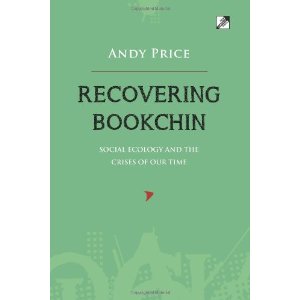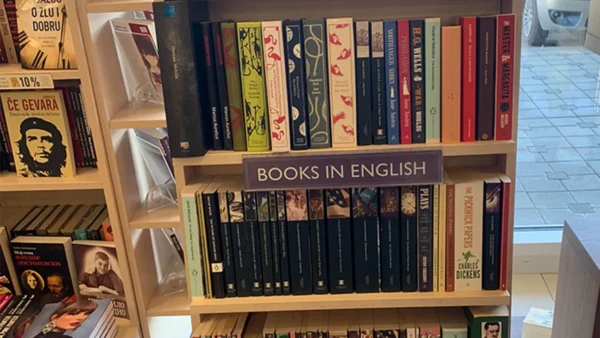 I read Murray Bookchin’s Social Ecology and Communalism a year or so ago, and in my review I asked for recommendations of more things to read by him.
I read Murray Bookchin’s Social Ecology and Communalism a year or so ago, and in my review I asked for recommendations of more things to read by him.
This was a pretty good recommendation. It’s not by Bookchin, but about him. Andy Price gives a good introduction to the essence of what Bookchin meant by social ecology, and to his programme for political change along anarchist and ecological lines.
The book is not a simple primer, though. Quite a large chunk of the book is given over to a vicious academic battle of which I was completely unaware. Bookchin, it seems, has been maligned quite badly by his former colleagues in the anarchist and Deep Ecology worlds, and this is Price’s attempt to “recover” the essence of Bookchin’s thought, much of which got lost in the attacks on him towards the end of his life (he died in 2006).
What I liked about the book was its clarity of purpose. Price is not trying to wade into the ideological battle that engulfed Bookchin’s last twenty years. His aim is to detach Bookchin’s thought from the more personal slurs on Bookchin himself, and to examine it and see if it holds any useful points for us as we try to negotiate our way through a perilous-looking 21st century.
He does the job very thoroughly and effectively, and those new to Bookchin’s thought will get a good sense of what he stood for. The lengthy sections on the battles he fought with other thinkers are surprisingly enlightening, too. Bookchin’s break with the Deep Ecology movement came as a result of an incident in 1987 which says a lot about him. Deep Ecology claims that living beings are all of equal value and should be treated as such – humans are just a part of the ecology of the world, with no claim to superiority. Sounds good to me. But the problem Bookchin saw in the work of many deep ecologists of the 1980s was a callousness towards people, and an inability to see the social causes of ecological crises. For example, one deep ecologist claimed that the solution to the Ethiopian famine was to “just let nature there seek its own balance, to let the people there just starve”.
Bookchin, on the other hand, emphasised the social causes, and believed in social solutions. He said the Ethiopians were starving “not because of nature. It is because of civil war, agribusiness, social problems.” The deep ecologists’ emphasis on population as a problem ignored the fact that it’s rich societies that consume most of the resources and reap most of the ecological havoc; it blamed poor Ethiopian farmers for the problems created by CEOs and politicians. The very idea of an ecological balance, he said, made no sense in a world already heavily affected by human development. The solution is not to turn back the clock to find a mythical balance, but to participate in creating solutions using the consciously-formed communities that are humanity’s unique achievement. By seeking to redress the anthropocentric view of the world, the deep ecologists went too far and made humans into a kind of scourge that existed outside nature. Bookchin’s idea was to create a truly ecological society that respected nature and saw humans as part of nature, not separate from it.
The book also uses Bookchin’s clashes with colleagues to illustrate more of his ideology. He broke with other anarchists, for example, in arguing for achieving social change through running for local elections. He saw the municipality as the vehicle for social change, and argued that social ecologists should take control of local councils and gradually federate with other like-minded local councils to effect change from the bottom up. To me it doesn’t sound very plausible, but then neither do the alternatives. Changing a system you fundamentally disagree with is a hard thing to do. Price does a good job of laying out exactly what Bookchin meant, and answering some of the main criticisms from anarchists who prefer to work outside the system.
The format works well, I think, because it naturally introduces not only Bookchin’s thought, but possible objections to it, and then answers those objections. Often the objections were things that I had come up with myself as well, so it was good to read Price’s rebuttals, which often made me think of the issue in a new way.
For those who are more familiar with the worlds of social ecology and anarchism, I’d say this is a must read. For more general readers like me, the detailed analysis of twenty-year-old academic infighting can be off-putting at first, but is surprisingly rewarding in giving a sense of Murray Bookchin’s thought and analysing it in the light of possible counter-arguments.




There are 4 comments
How interesting. I confess I am very fond of an old academic battle, because whatever the subject there are often passionately held beliefs surrounding impossible-to-solve issues, and that can be fascinating to read about. The Deep Ecologists make me think of the Animal Rights people, who will save a slug and plant a car bomb. So often there’s a story behind the political commitment, and the commitment is a symptom of something deeper and darker.
Hi litlove,
Yes, academic battles can be fascinating, and I was surprised how much I enjoyed reading about this one. I’d picked up the book expecting a kind of introduction to Bookchin’s thought, and when he said he was going to spend the first few chapters on some dispute from 1987 I thought “Oh no!” But it was a surprisingly engaging way into the issues themselves. I think it helped that the author was quite detached from the debate – his sympathies were clearly with Bookchin, but he was fair to both sides.
I find this set of ideas to be intriguing. It sounds like Bookchin’s viewpoints are workable and pragmatic though some of the views of his rivals not as so.
The idea of equal weight given to all life is something that I thought about over the years and bears further pondering.
Hi Brian
Yes, the equal weight thing is something I agree with, and I think that our descendants will be pretty shocked at the way we treat animals today. I don’t think it necessarily has to result in a callousness towards people, either. You can value human life just as much as those of other creatures. The problem comes, of course, when one creature’s survival threatens another’s. Should we value the lives of malaria-bearing mosquitos? That’s when things get complicated!